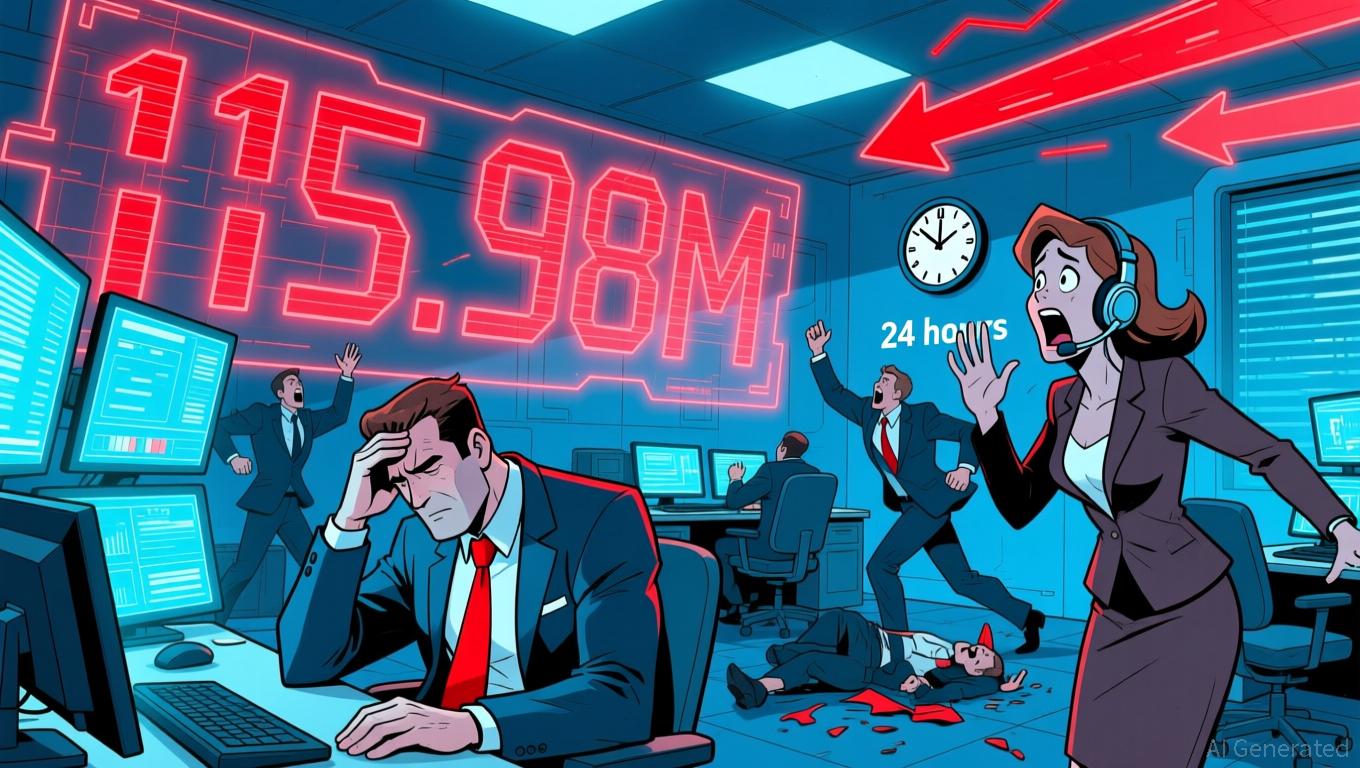Bitcoin News Update: Clear Regulations Drive Cryptocurrency’s Shift Into a Mainstream Asset Category
- SoFi becomes first FDIC-insured bank to offer consumer crypto trading via app, enabling Bitcoin , Ethereum , and Solana transactions from protected accounts. - U.S. regulators advance crypto integration through OCC custody guidelines and SEC's Token Classification Framework, clarifying legal status of digital assets. - Trump's tariff policies triggered 2.4% crypto market cap surge to $3.5T, highlighting macroeconomic ties to crypto volatility and institutional adoption trends. - Challenges persist as HIV
The American financial sector is experiencing a major transformation as both established banks and regulatory bodies move quickly to incorporate cryptocurrencies into the core of traditional finance.
Clearer regulations are driving this evolution. The Office of the Comptroller of the Currency (OCC) released new guidelines for 2025, allowing banks to provide custody and transaction services for crypto, as noted in the Bitget report. Meanwhile, the SEC is progressing with its "Token Classification Framework," which will clarify which digital assets are considered securities, according to a
LookonChain analysis . Chairman Paul Atkins explained that the framework will be based on the Howey Test, a Supreme Court decision from 1946 used to identify investment contracts, as mentioned in the LookonChain analysis. This regulatory foundation is intended to clarify the legal standing of digital assets, a crucial factor for broader institutional participation.Market forces are also influencing the crypto landscape. Former President Donald Trump’s recent pledge of $2,000 tariff dividends for U.S. citizens led to a 2.4% jump in the overall crypto market capitalization, reaching $3.5 trillion within a few hours, according to a
Yahoo Finance report .
Nonetheless, obstacles remain. HIVE Blockchain Technologies Ltd (NASDAQ: HIVE) experienced a 10.99% drop in its share price due to mining challenges and regulatory ambiguity, as reported in a
StocksToTrade article . Even with a strategic alliance with a top data center and a commitment to renewable energy, the company continues to face difficulties from crypto market volatility, as noted in the StocksToTrade article. At the same time, Spain’s Civil Guard detained the suspected mastermind behind a crypto-related Ponzi scheme worth 260 million euros, highlighting the ongoing dangers in unregulated parts of the industry, according to a CoinDesk report .The U.S. Commodity Futures Trading Commission (CFTC) is also taking significant action. Chair Rostin Behnam has made it a priority to broaden access to crypto spot trading and to permit stablecoins as collateral in derivatives markets, as stated in a
Yahoo Finance article . These initiatives are designed to integrate crypto more deeply into the U.S. financial system and to discourage retail investors from moving their activities offshore, according to the Yahoo Finance article.As the sector matures, major financial institutions are increasing their involvement. JPMorgan, Bank of America, and Citigroup are reportedly preparing to introduce loan products backed by stablecoins, as mentioned in the Futunn article.
The intersection of regulatory advancements, institutional engagement, and macroeconomic factors indicates that crypto is moving from a speculative market to a regulated asset class. However, volatility remains a significant factor—while Trump’s policies have fueled recent market growth, they also underscore the sector’s vulnerability to geopolitical developments, as reported in the Yahoo Finance report.
Disclaimer: The content of this article solely reflects the author's opinion and does not represent the platform in any capacity. This article is not intended to serve as a reference for making investment decisions.
You may also like
Ethereum Updates: BitMine Capitalizes on Market Slump to Acquire 2.9% of Ethereum Tokens
- Bitcoin fell below $103,000 on Nov 12 amid $120M+ leveraged liquidations on Binance, exposing crypto market fragility. - BitMine Technologies capitalized on the dip, acquiring 2.9% of Ethereum's supply ($828M) to boost treasury holdings. - $341.85M in total crypto liquidations highlighted overextended positions, with Ethereum short sellers losing $76M. - Aggressive bearish bets like James Wynn's $275K 40x short face liquidation risks if Bitcoin recovers above $6,856. - Analysts warn weak ETF inflows and

Prediction Markets Move Into the Mainstream with Polymarket’s Return to the U.S.
- Polymarket relaunches U.S. beta after CFTC fine, now compliant via $112M QCX acquisition. - Partnerships with Yahoo/Google boost legitimacy as trading volume hits $3.01B, targeting sports betting. - Faces competition from Kalshi and ProphetX, which seeks CFTC license for nationwide expansion. - Industry grapples with fraud risks amid scandals, prompting calls for clearer regulatory boundaries. - Traditional firms like eToro and CME explore prediction markets, signaling mainstream adoption.

Bitcoin Updates: Crypto Fear Index at 15—Is This Surrender or a Chance to Invest?
- Crypto Fear & Greed Index hit 15, a seven-month low, signaling extreme investor pessimism amid macroeconomic and regulatory pressures. - Historical data suggests such fear phases often precede market recoveries, with Bitcoin near 2022 rebound levels and Ethereum whale buying surging. - Bitcoin ETFs saw $523M inflows as institutional demand returns, contrasting Ethereum's outflows and Brazil/Japan's new regulatory crackdowns. - Analysts urge long-term investors to view the dip as an opportunity, while sho

Bitcoin Updates: Japan Strives to Foster Crypto Advancements While Ensuring Investor Protection Amid DATs Decline
- Japan Exchange Group (JPX) plans stricter rules for digital-asset treasury (DAT) firms amid volatile stock collapses, including enhanced audits and backdoor listing restrictions. - Metaplanet and Convano, major DATs holding thousands of BTC, have lost over 60% of their value, reflecting global market instability linked to crypto-heavy strategies. - Regulators warn DATs pose risks to retail investors due to reliance on volatile assets, while Japan balances innovation incentives with governance safeguards
